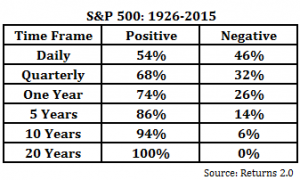If you were a member of the popular press, you’d probably be happy with 2018’s first quarter performance. At last – some volatility fueling news1 in early February, with plenty of enticing “largest,” “fastest,” and “worst” market superlatives to savor after a long, languid lull.
As usual, there are plenty of potential culprits to point to among current events: global trade wars heating up, the arrival of quantitative tightening (rising interest rates), troubles in tech-land over data privacy concerns, ongoing Brexit talks, and some interesting events over in the Koreas. At quarter-end, one hopeful journalist asked, “Is the Bear Market Here Yet?”2 Another observed: “[T]he number of [Dow Jones Industrial Average] sessions with a 1% move so far in 2018 are more than double 2017’s tally, and it isn’t even April.”3
Has the coverage left you wondering about your investments? Most markets have been steaming ahead so well for so long, even a modest misstep may have you questioning whether you should “do something,” in case the ride gets rougher still.
If we’ve done our job of preparing clients and their portfolio for market jitters, clients may might be able to cite back to us why they’ve already done all they can do to manage the volatility, and why it’s ultimately expected to be good news for evidence-based investors anyway. Remember, if there were never any real market risk, you couldn’t expect extra returns for your risk tolerance.
That said, you may have forgotten – or never experienced – how awful the last round of extreme volatility felt during the Great Recession. Insights from behavioral finance tell us that our brain’s ingrained biases cause us to gloss over those painful times, and panic all over again when they recur, long before our rational resolve has time to kick in.
If you noticed the news, but you’re okay with where you’re at, that’s great. If the volatility is bothering you, talk to a CFP® professional or other qualified financial professional; it may help ease your angst. If you continue to struggle with whether you made the right decisions during quieter markets, plan a rational shift to better reflect your real risk tolerances and cash-flow requirements. Not only is your peace of mind at least as important as the dollars in your account, you could end up worse off if you’ve taken on more risk than you can bear in pursuit of higher expected returns.
As Wall Street Journal columnist Jason Zweig said during the February dip: “A happy few investors … may have long-term thinking built into them by nature. The rest of us have to cultivate it by nurture.” We couldn’t agree more, and we consider it our duty and privilege to advise you accordingly, through every market hiccup.




 2) Capital markets have exhibited an upward trajectory over the long-term, yielding positive, inflation-beating returns to those who have stayed put for the ride.
2) Capital markets have exhibited an upward trajectory over the long-term, yielding positive, inflation-beating returns to those who have stayed put for the ride.